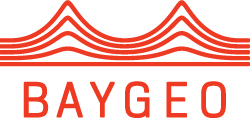
BayGeo’s Intro to ArcGIS Pro
ArcGIS Pro Basics Quick Start

Learn the basics of Esri's industry-standard ArcGIS Pro. Whether you are at square one or have previous experience, we welcome all learners with an interest in geospatial software.
A number of our recent students have tended to be non-traditional, in the sense that they are either recent graduates or are currently in the workforce. Such students take workshops like ArcGIS Pro Quick Start to build skills and enhance their career opportunities. Several students have expressed interest in transitioning to GIS-related careers.
Learning Outcomes
By completing this workshop you will be able to:
- Design a professional-looking map.
- Utilize ArcGIS Pro to manage and analyze a variety of geospatial types.
- Work with geoprocessing tools to deepen your analytical capabilities.
- Understand the basic principles of map projections and coordinate systems.
Lesson Plan
-
Workshop Introduction, Basics ArcGIS Pro and Introduction to Map Making
- Familiarize students with the ArcGIS Pro interface, panes (content, catalog, symbology), search window, toolbox
- Show students how to create a project, how to open a map, and connect to folders
- Adding layers
- Adding a base map
- Fixing broken links
- How to create a map
- Symbology (points, polygons, lines)
- Labeling (auto labeling, converting labels to annotations, halo)
- Creating a layout in ArcGIS Pro
- Adding map elements (north star, scale bar, legend, etc)
- Naming map files, saving/exporting/sharing maps and projects
-
Improving Map Making Skills, Selecting & Querying, and Creating Features
- Inset maps, choropleth maps, maps with pie/bar charts, dot density maps
- GIS file formats: difference between vector data and raster data
- Working with attribute tables; creating new fields - editing attribute tables
- Selecting by attribute
- Querying - Structured Query Language (SQL)
- Understanding the shapefile structure
- Creating shapefiles and geodatabases
- Creating new features & editing shapefiles
-
Spatial Reference Systems
- Datums – what are they and why are they important
- Definition of longitude/latitude
- Geographic and projected coordinate systems (GCS&PCS)
- Finding GPS coordinates of locations
- How to identify and modify a coordinate system to a dataset
- Projection on the fly
- Working with unprojected layers
- Defining a coordinate system (define projection tool)
- Modifying coordinate systems (project tool)
- Assigning GCS or PCS to rasters (project raster tool)
- How to add XY data to a map
-
Geoprocessing Tools
- Tabular join
- Spatial join
- Buffer tool
- Dissolve tool
- Merge tool
- Clip tool
-
ModelBuilder and 3D Maps
- Measuring area and distance
- Calculating distance
- Introduction to model builder
- Network analysis (routing, service area, etc.)
- Visualizing data in 3D
- Navigating a 3D scene
- Extruding buildings
Details
- Location: Online and in person (see table below)
- Instructor: Moumié Maoulidi
- Continuing Education Units: 1.5
- Cost: $625 ($375 for BayGeo members, USF students or alumni)
Dates & Schedule
| Date | Time | Location |
|---|---|---|
| Thursday, September 12 | 6-9 p.m. | Class meets on Zoom |
| Thursday, September 19 | 6-9 p.m. | Class meets on Zoom |
| Thursday, September 26 | 6-9 p.m. | Class meets on Zoom |
| Thursday, October 3 | 6-9 p.m. | Class meets in person at the University of San Francisco |
| Thursday, October 10 | 6-9 p.m. | Class meets in person at the University of San Francisco |
| Date | Time | Location |
|---|---|---|
| Thursday, November 7 | 6-9 p.m. | Class meets on Zoom |
| Thursday, November 14 | 6-9 p.m. | Class meets on Zoom |
| Thursday, November 21 | 6-9 p.m. | Class meets on Zoom |
| Thursday, December 5 | 6-9 p.m. | Class meets on Zoom |
| Thursday, December 12 | 6-9 p.m. | Class meets on Zoom |
Your Instructor
Moumié Maoulidi's passion for GIS is rooted in a conviction that, in an ever-changing world, geospatial data helps people solve real world problems. He currently works for the City and County of San Francisco (CCSF) and prior to that, he worked in academia, UNICEF, and the private sector. Moumié has a Ph.D. in Economics and Education and an Ed.M in International Education Development from Columbia University.

The University of San Francisco Geospatial Analysis Lab and BayGeo’s GIS Education Center, a geospatial non-profit organization in the San Francisco Bay Area, have designed a geospatial certificate program to offer a skill-based curriculum that addresses the industry's latest technologies.
Take the Next Step
Whether you're a professional seeking to enhance your GIS expertise or a beginner eager to explore the field, you'll gain hands-on experience and invaluable insights to stay ahead in the dynamic geospatial landscape.